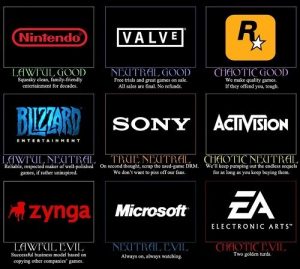(ThyBlackMan.com) Mobile gaming has enjoyed a great deal of growth, thanks to game developers and booming success of their games. Everything looks good for the future of mobile games but something is missing. It’s true that many leading companies are releasing mobile games, but still, many top video game companies and indie studios are not interested in mobile game development. When asked about the reasons why many top studios are still not working on mobile games, developers told many interesting things about the industry. Here are 10 reasons top video game companies are not bringing their games on Android and iOS platforms.
- App clones
One day my friend suggested me a game and I was curious to download it on my phone. It wasn’t hard to find the game since I remembered its name. I typed the keyword on Google Play Store and to my surprise, there were plenty of knock-offs available. I believe most of us just rely on the number of downloads, review count and ratings to judge whether it’s the original game or not.
Some games and app clones have become even more popular than the original ones. Many popular game studios have raised concern over intellectual property rights in mobile gaming but unfortunately, mobile users want entertainment at any cost. Ethics and the concept of right and wrong are slowly disappearing from the mobile content space.
- The dominance of free-to-play content
Mobile games come in three ways. First is the completely free content which is either crappy or is dominated by puzzle and board games where the procedural generation of content doesn’t require developers to write a thousand lines of codes every week. Then there are games that you can download for free and pay for in-game items to progress further. The third case scenario is where serious developers come into the picture. Their goal with their game is beyond making quick money. Unfortunately, this is the most underrated category on mobile platforms.
- The rich get richer
Unless you’ve been living under a rock, you know that nobody talks about the apps launched by hundreds of celebrities from around the world. Nobody actually cares about those apps and they don’t even appear on the game charts. Where have those apps gone? It is not like all those apps and mobile games that don’t appear on top charts are crappy or useless. The problem is, the games and apps that appear on the top charts are the free ones and are given more exposure than the new trending games.
Most of the apps and games are glued to the top charts and they continue to grow because it’s one of the only things a mobile user sees every time. People tend to try these apps and these apps become more popular.
- Mobile is for casual gaming
Ever heard people saying they are “hardcore mobile gamers?” The term “hardcore gamer” is often mocked in the mobile space. It’s a common belief that mobile devices are for casual gaming. It takes less than a second to uninstall a game on mobile phones and people become excessively careful about data usage when it comes to downloading and trying a new game.
Even after many years have passed, we don’t have that gaming culture in the mobile space. Games like Pokemon GO, Fortnite and many others that come from Square Enix, EA, Gameloft, and Supercell have built a huge follower base, but most of them are simply focusing on delivering free or freemium content.
- It’s an unregulated market
With an estimated worth of over $50 billion, mobile games account for half of the gaming revenue worldwide. The problem is, the revenue is not distributed equally among all the segments. The mobile gaming market is unregulated and that’s why the mobile gaming, for most developers, is not about service and quality. Instead, developers are on a quest to deliver cheap or free content. It leads mobile users to look for cheaper alternatives and most of them look for games with the same mindset.
- Poor content discovery
Being found is one of the biggest challenges for mobile game developers. Developing high-quality mobile games isn’t easy. In the first week, even two or three negative reviews can turn away potential users. Let’s say you’ve developed a high-quality mobile game and you’ve added it to the Android or Apple app store. Now your biggest challenge is content discovery. Being found on the chart is not easy, especially when other developers are hell bent on advertising “free” content. With hundreds of games hitting app stores every day, it’s not easy for users to find your game. The content discovery is complex and most of the time, it’s unfair.
- Nobody truly cares about innovation
If a group of developers is working on a console or PC game, their innovative ideas will be recognized and rewarded. Even if they don’t secure a strong position on the sales charts, they can still make things better and build a community on these platforms. In the mobile gaming space, the efforts a game developer makes, are not rewarded in the same way. Google and Apple’s approach to mobile games doesn’t help developers. On the Google Play Store, you will see sections called “Editors’ Choice,” but again that’s not enough.
- Piracy culture
Mobile game developers have been dealing with app clones for a long time, and now they have one more battle to fight – piracy culture. There are countless websites that offer free pirated versions of paid mobile games and apps. It not only poses a serious threat to thousands of smartphones, but people’s love for piracy disappoints developers.
When Google itself is the king of search, it’s sad that the company does not even blacklist websites that shamelessly offer pirated games. If Google wants, the company can easily stop indexing such websites. Taking strict actions against these websites will certainly restore the faith of people in mobile game development.
- Profits are hard to find
After spending time and money on development, promotion, and free updates, it’s really hard for mobile game developers to find profits. There are developers who earn a lot of money, but for many, despite putting money in different stages of development and promotion, earning decent profits is not easy.
Some developers suggest that one should have a strong community on PC or consoles before trying something on the mobile platform. The big competition and lack of visibility kill many good mobile games.
- PC and consoles are irreplaceable
PC and console gaming has so much that mobile platform lacks – a community of players, publishers, advertisers, investors, rewards, recognition, and ways to promote games in the real world. Mobile gaming is not dead. In fact, it is set to grow in the future, but the current market scenario makes the mobile platform a risky area to play in.
Game development not only needs time, money and serious efforts, but it also needs a community of customers who are looking for quality and have a desire to try something new. On the mobile platform, you’ll hardly find people who really pay attention to what interesting things are coming.
Staff Writer; Corey Shaw
Have any Tech Tips? News? Hit up our Tech Guru at; CoreyS@ThyBlackMan.com




















Leave a Reply